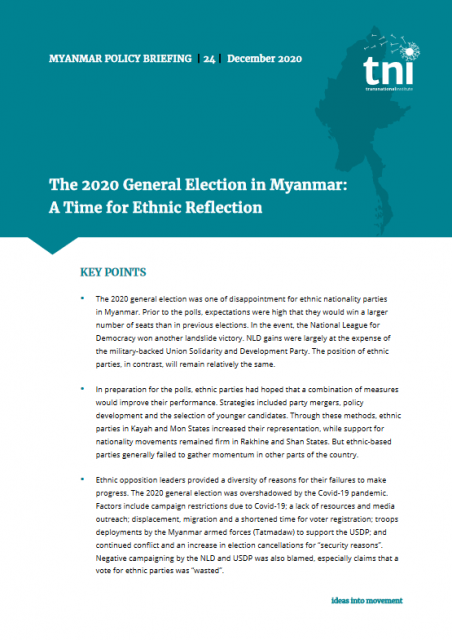The 2020 General Election in Myanmar: A Time for Ethnic Reflection


The 2020 general election was one of disappointment for ethnic nationality parties in Myanmar. Prior to the polls, expectations were high that they would win a larger number of seats than in previous elections. In the event, the National League for Democracy won another landslide victory. NLD gains were largely at the expense of the military-backed Union Solidarity and Development Party. The position of ethnic parties, in contrast, will remain relatively the same.
In preparation for the polls, ethnic parties had hoped that a combination of measures would improve their performance. Strategies included party mergers, policy development and the selection of younger candidates. Through these methods, ethnic parties in Kayah and Mon States increased their representation, while support for nationality movements remained firm in Rakhine and Shan States. But ethnic-based parties generally failed to gather momentum in other parts of the country.
Ethnic opposition leaders provided a diversity of reasons for their failures to make progress. The 2020 general election was overshadowed by the Covid-19 pandemic. Factors include campaign restrictions due to Covid-19; a lack of resources and media outreach; displacement, migration and a shortened time for voter registration; troops deployments by the Myanmar armed forces (Tatmadaw) to support the USDP; and continued conflict and an increase in election cancellations for “security reasons”. Negative campaigning by the NLD and USDP was also blamed, especially claims that a vote for ethnic parties was “wasted”.
Four main reasons are considered to account for the scale of the NLD victory. Elections in Myanmar are always dominated by the winning party among the ethnic Bamar majority under the country’s “first-past-the-post” voting system. The Covid-19 emergency strengthened the advantage of the incumbent government. A victory for the NLD is widely regarded as the most likely way to end military dominance in national politics. And State Counsellor Daw Aung San Suu Kyi remains a figure of enduring popularity in the country.
Following the election, NLD and Tatmadaw leaders reached out to ethnic parties. Suggestions included new peace talks, a reduction in military activities and the appointment of more nationality representatives in the government. All these initiatives were welcomed. But ethnic leaders questioned why these steps had not been taken prior to the polls. Resentment has deepened during the past few years against perceived exclusion and marginalisation. Despite repeated promises, neither the Nationwide Ceasefire Agreement nor 21st Century Panglong Conference has made effective progress.
A window of opportunity presently exists. The NLD has a mandate to push forward with the integral tasks of peace-building and democratic reform. But, for this to happen, it is essential that the government develop a collaborative approach with ethnic peoples and parties to administering their areas and addressing their grievances. In the aftermath of another “first-past-the-post” election, the risks of a deepening in centre-periphery divisions and, potentially, armed conflict are high unless immediate steps are taken.
The NLD’s victory in the 2015 general election was greeted with great hopes. It is vital that the next NLD-led government is not followed with similar impasse and conflict regression. Mistakes from the past must be learned, and urgently-needed reforms should not be pushed another five years down the road. Bitter experiences in every era of government since independence warn that justice, inclusion and representation are imperative for all peoples. Elections alone will not resolve challenges that are political at root.

